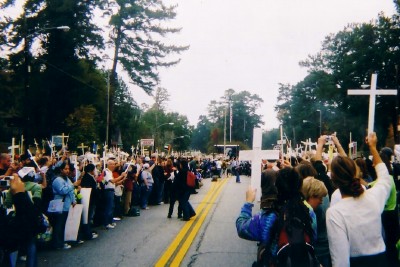The passage for this sermon is John 9:1-5
Throughout my life I have been trying to understand why I have a speech impediment. Why did God do this to me? At first I thought it was a curse done to me because of past sins; just as the Disciples ask Christ about the man who is blind. Then I wondered for some time if it was a prank on me. One day, I would wake up and this impediment would be gone. Jesus would be appearing more like Buddy Jesus from the movie Dogma and He would say “April Fools!”
Most of my life, I longed for that day to be whole, to feel whole. Why God? Why am I not whole? Then throughout seminary I have tried to reconcile my speech impediment through looking at it as a gift, as Jesus seems to proclaim in John 9. Christ must have meant for this to happen. A way to use me in the world. In wrestling with this, I have come to see that this too is not true. Being a person with a disability is not a gift nor is it about sin. I have realized the reason that I have felt like an outcast has nothing to do with my relationship with Christ. The source of my pain has been the reactions of my fellow brothers and sisters in Christ here on Earth.
Part of Jesus' witness in the Gospels is about restoring outcasts to their communities. The Ecumenical Disability Advocates Network contends that “The healing stories in the gospels, [like John 9] are primarily concerned with restoration of persons to their communities, not the cure of their physiological conditions.” This man who was blind was not welcome in his community and is only restored to his community after the miracle.
Furthermore, at the end of this story, Christ proclaims that people who can physically see are spirituality blind. Then the inverse must be true: People who have disabilities can be spiritually whole. This speech impediment is just a part of who I am, not a sin, not a gift. Our collective sin have been trying to reach an unrealistic perfection while living in an imperfect world.
- Let's remember: We are asked to live faithfully, not sinlessly.
- Let's admit: We as humans err a lot.
- Let's confess: We will not be perfect as it is currently defined in the modern world.
By acknowledging this truth that we worship a God who is differently abled and yet still whole, we can admit that our faithfulness, not our perfection, bring us into the body of Christ. Therefore, the resurrection in two and a half weeks is a collective restoration for all of us. We each have different abilities and struggles. We all have gifts to offer each other and the world.
Let me caution you all today too: People with disabilities are not here for abled body people to feel blessed or feel lucky. We are not here for others' self-realizations. We are here to be active parts of the body of Christ and to offer our own gifts and talents to the world. Attitudes of pity, judgement, and fear of people with disabilities interfere with this restoration.
This is the Good News! On Easter, we, as an imperfect people, will be restored back into this whole living differently-abled body of Christ.



